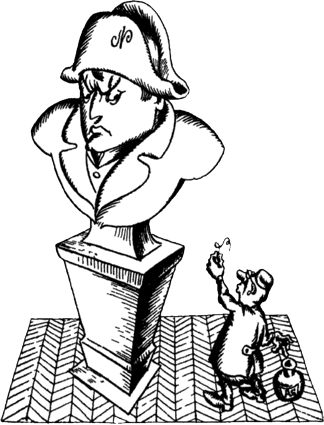107Stories About ChemistryINDEX |
86.
The Death of Napoleon: Legend and Reality
According to the official version Napoleon Bonaparte I died on the Island of St. Helena on May 5, 1821. The cause of his death was cancer of the stomach, a disease which brought the former ruler of half the world to his grave in less than half a year. The coroner�s statement was signed by Dr. Antommarchi. Though this version was firmly established, few people believed it, and not without reason. Many of the great emperor�s retainers insisted to the end of their days that Napoleon had not died a natural death but had been poisoned. And Bonaparte himself, in dictating his will a week before his death, said: �I have been killed by the British oligarchy and its hired assassins.� But what could Napoleon have been poisoned by? More than enough poisons of various kinds were known in the last century, but the unknown murderer would hardly use just any of them to assassinate the emperor.  What was needed was a tasteless poison, so that the victim should not become suspicious. It would have to be not a very strong one, one that would accumulate slowly in his organism and kill him gradually. Such a poison could have been arsenic. And so there appeared another version, namely, that Bonaparte had been poisoned by arsenic. But how to prove it? No end of assumptions could be made, but what was needed here was unquestionable proof. No witnesses were left. To exhume the emperor�s remains from his tomb for an investigation seemed sacrilege. Nevertheless, 140 years after the sad event an unusual investigation was started at the Scotch town of Glasgow concerning the case of the violent death of Napoleon. The case was pleaded by two physicians, Drs. Smith and Forshufwood. They started by sending a strange request to many of the world�s museums, inquiring whether they had in their collections a ... tuft of hair of the great Frenchman. It took some time before fortune finally favoured the investigators. They received a few hairs cut off Napoleon�s head several hours after his death. The physicians knew that arsenic taken up by the human organism gradually accumulates in the hair. If they detected it in Bonaparte�s hair, ... But this is more easily said than done. The amount of arsenic in the hair is very small indeed. Chemical methods of analysis could have been used, of course, but their sensitivity was too low to exclude the possibility of error, and here one had to be absolutely sure. Then the Swedish physicist Wassen joined in on the investigation. The precious hairs were carefully sealed in an aluminium cylinder and placed for a few hours in a uranium reactor. When the hairs were retrieved and subjected to special measurements, it became quite clear that Napoleon had indeed died of arsenic poisoning. The amount of arsenic in his hair was thirteen times above the normal content. Moreover, the arsenic had been administered gradually, in small doses. How had the scientists succeeded in establishing the true cause of Bonaparte�s death? How could they detect arsenic without using a single chemical method? |





